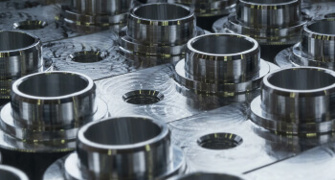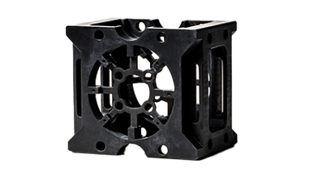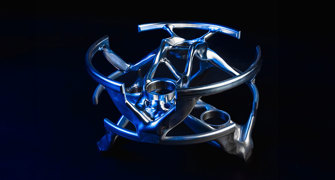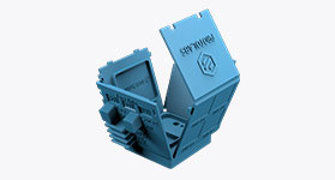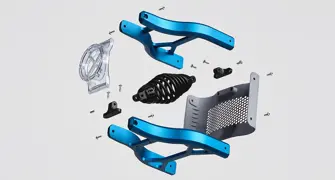Scientific Molding Supports On-Demand Manufacturing Capabilities
Over the years, Protolabs has evolved from a prototype shop focused on rapidly delivering injection-molded parts, to a full digital manufacturing supplier that, in addition to prototyping services, offers on-demand manufacturing to meet customer needs for low-volume production, bridge tooling, and supply chain emergencies.
To support our growth in digital manufacturing, our scientific molding process—a systematic approach to how we set up our molding methods—serves as the foundation for our on-demand manufacturing services.

The Scientific Molding Process
At Protolabs, we adhere to scientific molding to ensure that each time we set up a press, it is done in the same way it was completed previously for a specific order. Scientific molding optimizes machine process settings related to fill, pack, and hold.
In doing so, it ensures that each part has the same properties as the previous part, specifically related to the optimal pressure, amount of resin, speed at which the polymer fills the cavity, and hold time to ensure consistency from part to part. We use industry best practices for our scientific molding process that results in two key benefits: more consistent parts that are higher quality. And we offer inspection reports for quality validation.
Greater Consistency is Goal of Scientific Molding
Greater consistency is the goal of this method. Once documenting the ideal set up process for each mold, this same process is followed every single run—and any modifications are documented to ensure traceability across molding runs.
In creating a process development report for each mold and its parts, it creates consistency. Whether the part will be run again on a different machine, or if it will be ordered once again in a few months, the scientific molding process ensures that consistency shines by documenting the exact process that was used to set up the molding process to meet the particular resin needs and dimension requirements for that part. In doing so, each part maintains consistency along the way.
A Commitment to Higher Quality Molds
In addition to consistency across parts— no matter the run—the scientific molding process results in higher quality parts.
Need an example? Consider how some higher temperature semi-crystalline resins, for instance, require a warmed up mold so it can crystalize properly. The scientific molding process addresses this by documenting the actual temperature of the mold so that the material is set up properly—meaning that the resin has the opportunity to crystallize. Most parts that use a high temperature semi-crystalline resin like PPA, for instance, do so because the parts need to function in a high temperature environment. If the material doesn’t crystallize within the mold, this means that the material will while it’s in operation--which can cause warping, shrinking, and even weaken the part performance in the process.
Regardless of the type of resin, scientific molding helps our customers with their quest for quality, consistent end-use parts. From having a systematic process in place for setting up the machine to creating a process development report for each mold and part that drives consistency and quality, scientific molding serves as an internal process. This process offers benefits to customers who are seeking production parts and helps us deliver consistent quality, whether it’s the first, third, or hundredth run. Combined with our digital manufacturing methods, Protolabs’ injection molding service offers a best practice approach for an end-use part that meets our customers’ unique needs.
Did you know? Protolabs uses scientific molding for its injection molding on-demand manufacturing service for low volume production, bridge tooling, and supply chain emergencies. Learn more here.
 Jack Rulander is a senior R&D engineer at Protolabs. He works on introducing new technologies to the company's digital manufacturing process for injection molding. Rulander has nearly 20 years of experience in the plastics engineering industry. He holds a Ph.D. in plastics engineering from the University of Massachusetts Lowell, and a bachelor's degree in plastics engineering technology from Penn State University.
Jack Rulander is a senior R&D engineer at Protolabs. He works on introducing new technologies to the company's digital manufacturing process for injection molding. Rulander has nearly 20 years of experience in the plastics engineering industry. He holds a Ph.D. in plastics engineering from the University of Massachusetts Lowell, and a bachelor's degree in plastics engineering technology from Penn State University.

